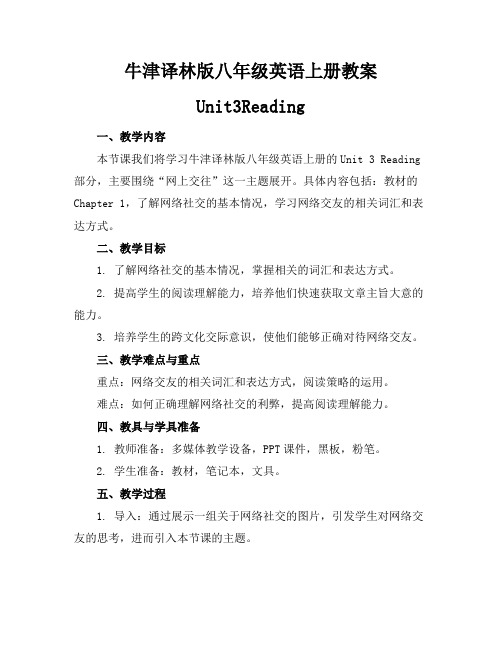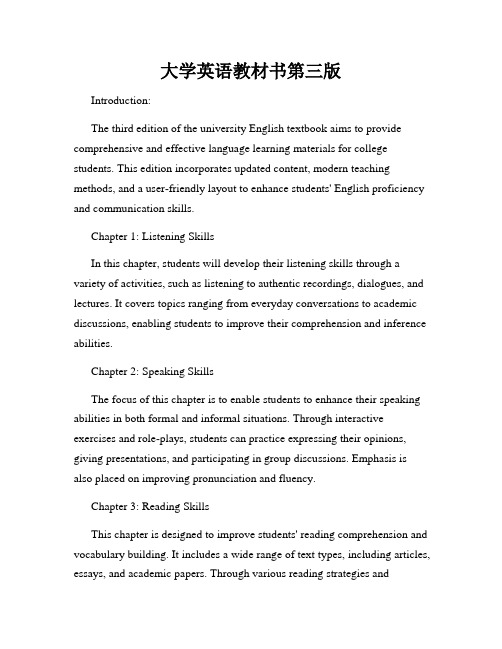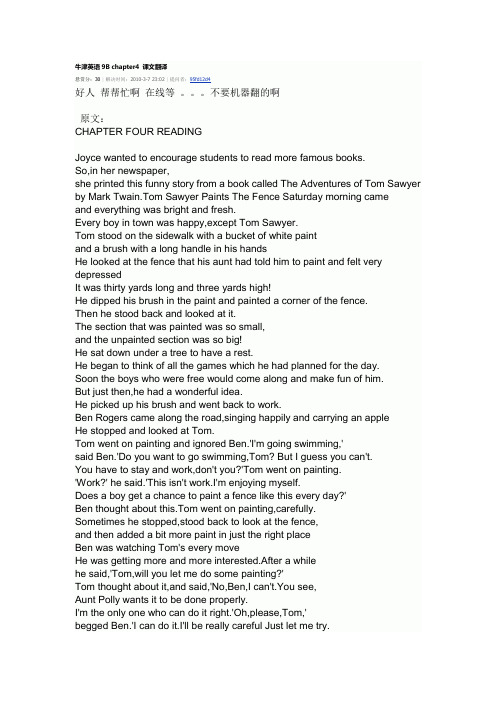9B chapter3 Reading
9B_U3_Grammar(正式)

初 中 英 语
九 下
4 Take a map of Beijing with you while traveling unless you have a guide or know Beijing well. b 5 Unless the weather forecast says it is going to rain, you do not have to take an umbrella or a raincoat with you. f 6 Do not miss the traditional snacks in Beijing, unless you do not like Chinese a food.
You cannot imagine how amazing they are unless you see them with your own eyes.
初 中 英 语
九 下
If you don’t have a map, you’ll get lost easily. Unless you have a map, you’ll get lost easily. You’ll get lost easily unless you have a map.
初 中 英 语
九 下
Part Two Practice (Page 48)
1 Unless you want to buy lots of souvenirs, we suggest you not taking a lot of money with you. d 2 There is no need to get up very early in the morning unless you want to watch the raising of the national flag. c 3 Unless you are in a hurry, you do not need to take a taxi. e
reading9B_Chapter_4

9B Chapter 4Text 1T om Sawyer Paints The FenceSaturday morning came, and everything was bright and fresh. Every boy in town was happy, (1)_____ Tom Sawyer.Tom stood on the sidewalk (2)_____ a bucket of white paint and a brush with a long handle in his hands. He looked at the fence that his aunt had told him (3)_____ and felt very (4)_____. It was thirty yards long and three yards high! He dipped his brush in the palm and painted a corner of the fence. Then he stood back and(5)_____. The section that was painted was so small, and the (6)_____ section was so big! He sat (7)_____ a tree to have a rest.He began to think of all the games (8)_____ he had planned for the day. (A)很快空闲的男孩们就会走过来取笑他。
But just then, he had a wonderful idea. He picked up his brush and went (B)_________ to work.Ben Rogers came along the road, (9)_____ happily and carrying an apple. He stopped and looked at Tom. Tom went on painting and (10)_____ Ben.‘ I’m going swimming,’ said Ben. ‘Do you want to go swimming, Tom? But I guess you can't. You have to stay and work, (11)_____you?’Tom went on painting. 'Work?' he said. 'This isn't work. I'm enjoying myself. Does a boy get a chance to paint a fence like this every day?'Ben thought about this. Tom went on painting, carefully. (C) Sometimes he stopped, stood back to look at the fence, and (D)then added a bit more paint in just the right place. Ben was watching Tom's every move. He was getting (E)越来越感兴趣.After a while, (F) he said, 'Tom, will you let me do some painting?'Tom thought about it, and said, 'No, Ben, I can't. You see, Aunt Polly wants it to be done properly.(G)我是唯一能做到的。
牛津译林版八年级英语上册教案Unit3Reading

牛津译林版八年级英语上册教案Unit3Reading一、教学内容本节课我们将学习牛津译林版八年级英语上册的Unit 3 Reading 部分,主要围绕“网上交往”这一主题展开。
具体内容包括:教材的Chapter 1,了解网络社交的基本情况,学习网络交友的相关词汇和表达方式。
二、教学目标1. 了解网络社交的基本情况,掌握相关的词汇和表达方式。
2. 提高学生的阅读理解能力,培养他们快速获取文章主旨大意的能力。
3. 培养学生的跨文化交际意识,使他们能够正确对待网络交友。
三、教学难点与重点重点:网络交友的相关词汇和表达方式,阅读策略的运用。
难点:如何正确理解网络社交的利弊,提高阅读理解能力。
四、教具与学具准备1. 教师准备:多媒体教学设备,PPT课件,黑板,粉笔。
2. 学生准备:教材,笔记本,文具。
五、教学过程1. 导入:通过展示一组关于网络社交的图片,引发学生对网络交友的思考,进而引入本节课的主题。
2. 阅读前:教师带领学生回顾网络交友的相关词汇,为新课的学习做好铺垫。
3. 阅读中:学生自主阅读课文,教师提问检查学生对文章的理解,引导学生关注文章的主旨大意。
a. 学生阅读第一段,了解网络社交的普及程度。
b. 学生阅读第二段,了解网络交友的优缺点。
c. 学生阅读第三段,学习如何正确对待网络交友。
4. 阅读后:教师组织学生进行小组讨论,讨论网络交友的利弊以及如何保护自己,然后进行课堂分享。
5. 例题讲解:针对本节课的重点,教师为学生讲解阅读理解题型的解题策略,并进行实际操作演示。
6. 随堂练习:学生完成课后练习题,巩固所学知识。
六、板书设计1. Unit 3 Reading: Online friendship2. 词汇:普及(popular),优点(advantage),缺点(disadvantage),谨慎(cautious)3. 阅读策略:快速浏览,关注文章主旨,关注细节七、作业设计a. What are the advantages of online friendship?b. What are the disadvantages of online friendship?c. How can we protect ourselves when making friends online?2. 答案:见教材课后练习答案。
牛津英语 9B 单词表

Chapter 2Reading2R1residence n.房子;大宅;官邸ˈrezidəns2R2educational adj.教育的ˌedʒəˈkeɪʃənəl 2R3Auckland n.奥克兰ˈɔ:klənd2R4host n.主人,东道国həust2R5confident adj.自信的ˈkɔnfidənt2R6fund v.(为机构或项目等)拨款fʌnd2R7vision n.视力;视觉;幻想ˈviʒən2R8aim n.目的eim2R9deeply adv.深深地;极大地,强烈地ˈdi:plɪ2R10gap n.分离,差距ɡæp2R11dump n.(垃圾)堆dʌmp2R12situation n.形势;环境;状况ˌsitjuˈeiʃən2R13actually adv.实际上ˈæktʃu:əli:2R14fortunate adj.幸运的ˈfɔ:tʃənit2R15scholarship n.奖学金;学问;学术成就ˈskɔləʃip2R16airline n.航空公司;航空服务ˈɛəlain2R17attend v.参加;出席;照看əˈtend2R18flower-arranging n.插花2R19tea-making n.沏茶,泡茶ti: ˈmeɪkɪŋ2R20tour v.旅行;参观;观赏tuə2R21Kyoto n.京都市kiˈəutəu2R22Yokohama n.横滨(日本港市)ˈjəukəˈhɑ:mə2R23turn out to be结果是,证明是2R24Korea n.韩国kəˈriə2R25Brazil n.巴西brəˈzil2R26shy adj.害羞的;怕生的ʃai2R27hoot v.鸣响hu:t2R28horn n.号角;示警装置hɔ:n2R29fence n.围墙,栅栏fens2R30messy adj.凌乱ˈmesi:2R31sight n.视野;视界;看;视力sait2R32guest n.宾客;客人ɡest2R33service n.服务(机构)ˈsɜːvɪs2R34prove v.证明;证实pru:v Listening2L1council n.委员会;会议;议会;政务会ˈkaunsl Language2Lan1conditional adj.有条件的;含有条件的kənˈdɪʃənəl2Lan2drama n.戏剧ˈdrɑ:mə2Lan3organization n.机构;组织团体ˌɔ:ɡənaiˈzeiʃən 2Lan4Spanish adj.西班语ˈspænɪʃ2Lan5choice n.选择tʃɔis2Lan6burglar n.窃贼ˈbə:ɡlə2Lan7nappy n.尿布ˈnæpi:2Lan8truthful adj.诚实的ˈtru:θfəl2Lan9shoplift v.入店行窃ˈʃɔpˌlɪft2Lan10check-out n.付款处;收银台tʃek aut2Lan11change n.零钱,找头tʃeindʒ2Lan12flyover n.立交桥flai.əuvə2Lan13nasty-looking adj.一副凶相的样子ˈnɑ:sti ˈlukiŋ2Lan14scold v.骂;责骂skəuld Speaking2S1van n.房车væn2S2vine n.葡萄藤vaɪn2S3withered adj.枯萎的;凋谢的ˈwɪðəd2S4vest n.内衣,汗衫,背心,坎肩vest Writing2W1signature n.签名;签字;署名ˈsiɡnitʃəMore Practice2M1official adj.官员的,官方的,正式的əˈfiʃəl2M2be prosecuted检举;告发;对某人提出诉讼bi: 'prɔsikju:tid 2M3tuition n.教学;学费tjuˈiʃən2M4alternative n.可能性之一;可能性的选择ɔ:lˈtə:nətiv2M5fee n.服务费;报名费fi:2M6split v.分担;分摊split2M7stage n.阶段;时期steidʒ2M8primary adj.最重要的;首要的;小学的ˈpraiməri2M9secondary adj.次要的;第二的ˈsekəndəri2M10core n.核心;精髓kɔ:2M11physical n.体育ˈfizikəl2M12additional adj.追加的;另外的əˈdiʃənl2M13economic adj.经济的ˌɪkəˈnɔmik2M14religious adj.宗教的riˈlidʒəs2M15compulsory adj.必须做的,按规定做的kəmˈpʌlsəri2M16limit n.限制;限度ˈlimit2M17prominent adj.显著的;卓越的ˈprɔminənt2M18aspect n.方面ˈæspekt2M19dinosaur n.恐龙ˈdainəsɔ:2M20autograph n.亲笔签名ˈɔ:təˌgræfChapter3Reading3R1would rather宁愿,宁可;较喜欢wud ˈrɑ:ðə3R2Nobel Peace Prize n.诺贝尔和平奖nəʊˈbel pi:s3R3orphanage n.孤儿院ˈɔ:fənɪdʒ3R4management n.经营,管理ˈmænidʒmənt3R5polytechnic n.理工学院ˌpɔli:ˈteknɪk3R6fame n.荣誉;名声,名望feim3R7career n.职业,生涯kəˈriə3R8Fine Arts n.高雅艺术fain ɑ:ts3R9success n.成功;成就səkˈses3R10social adj.社会的ˈsəuʃəl3R11abandon v.遗弃əˈbændən3R12independent adj.独立的ˌɪndiˈpendənt3R13employ v雇用;使用,利用imˈplɔi3R14countless adj.无数的ˈkaʊntlɪs3R15extraordinary adj.非凡的;特别的iksˈtrɔ:dnəri3R16contest n.竞赛,比赛ˈkɒntest3R17turning point n.转折点,转机ˈtɜ:nɪŋ pɔint3R18on everyone's lips被每个人谈论ɔn ˈevriwʌns lips 3R19ambitious adj.雄心勃勃的,有野心的æmˈbiʃəs3R20path n.道路,途径;小道pɑ:θ3R21cosmetic n.化妆品kɔzˈmetik3R22fortunately adv.幸运地ˈfɔ:tʃənitli3R23fundraising n.&adj.筹款;募款的ˈfʌndˌreɪzɪŋ3R24burning adj.强烈的,极端的ˈbɜ:nɪŋ3R25desire n.渴望,渴求diˈzaiə3R26degree n.学位;度数diˈɡri:3R27proper adj.合适的ˈprɔpə3R28syllabus n.教学大纲,课程大纲ˈsɪləbəs3R29devote v.付出;奉献diˈvəut3R30photography n.摄影,照片fəˈtɔgrəfi:3R31bring up培养,养育briŋ ʌp3R32wander v.游荡,漫游,闲逛,流浪ˈwɔndə3R33make-up n.化妆品ˈmeɪkˌʌp3R34admire v.钦佩;赞赏ədˈmaiə3R35determined adj.有决心的,意志坚定的dɪˈtɜ:mɪnd Listening3L1appointment n.任命;约会;职位əˈpɔintmənt3L2shampoo n.洗发液ʃæmˈpu:3L3cancel v.取消ˈkænsəl Language3Lan1particular adj.个人的;个别的;特别的pəˈtikjulə3Lan2public housing公屋;政府供给的住宅ˈpʌblik ˈhauziŋ3Lan3squatter n.蹲着的人; 擅自占用房屋或土地的人ˈskwɔtə3Lan4available adj.可得到的,可用的əˈveiləbl3Lan5industrialized使工业化的inˈdʌstriəlaizd3Lan6poverty n.贫穷,贫困;缺乏;低劣ˈpɔvəti3Lan7beg v.乞讨beɡ3Lan8stunt n.特技表演;引人注意的举动stʌnt3Lan9industry n.工业;企业;行业ˈindəstri3Lan10giant n.巨人ˈdʒaiənt3Lan11patient n.&adj.病人;有耐心的ˈpeiʃənt3Lan12medical adj.医学的;医疗的ˈmedikəl Speaking3S1manage v.负责;管理;经营;应付做成某事ˈmænidʒ3S2offer v.提议,建议ˈɔfə3S3vacuum v.用真空吸尘器打扫ˈvækjuəm Using English3U1Die charts圆形统计图,饼分图3U2unfortunately adv.不幸的是ˌʌnˈfɔ:tʃənitli3U3pattern n.模式ˈpætən3U4face cream面霜3U5amount v.总计əˈmaunt3U6face powder n.粉底feis ˈpaudə3U7lipstick n.口红ˈlipstik3U8perfume n.香水ˈpə:fju:m3U9combined adj.联合的;相加的kəmˈbaɪnd3U10clockwise adj.顺时针方向的ˈklɔkwaiz3U11protractor n.量角器prəˈtræktəWriting3W1childhood n.童年ˈtʃaildhud3W2design n.设计;设计图diˈzain3W3royal adj.王室的ˈrɔiəl3W4save up积攒seiv ʌp More Practice3M1talent n.特殊的勇力;天才;才能ˈtælənt3M2naturally adv.天生地;必然ˈnætʃərəli3M3curious adj.富于好奇心的;有求知欲的;感兴趣的ˈkjuəriəs3M4descovery n.发现disˈkʌvəri3M5finding n.(常用复数)调查结果ˈfaindiŋ3M6lightning conductor n.避雷针ˈlaitniŋ kənˈdʌktə3M7lens n.透镜;镜片lenz3M8bifocals双光眼睛,远近两用的3M9watertight adj.水密的;防止水进入或流出的ˈwɔ:tətait3M10bulkhead n.防水隔板,隔墙ˈbʌlkhed3M11establish v.建立;设立isˈtæbliʃ3M12paving n.用石或砖铺的面ˈpeiviŋ3M13lighting n.照明设备;光;光线ˈlaɪtɪŋ3M14confuse v.打乱,搅乱,混淆kənˈfju:z3M15motion n.动作;运动姿态ˈməuʃən3M16genius n.天才;创造力;天才人物ˈdʒi:njəs3M17silver n.银子ˈsilvə3M18mine n.矿井main3M19persistence n.坚持不懈;执意pəˈsɪstəns 3M20conquer v.以武力征服ˈkɔŋkəChapter4Reading4R1rifle n.步枪,来复枪ˈraifl4R2steamboat n.汽船,汽艇ˈsti:mbəut 4R3cart n.手推车;四轮马车kɑ:t4R4adventure n.冒险;奇迹;历险ədˈventʃə4R5yard n.码;院子jɑ:d4R6slightly adv.稍微,略微ˈslaɪtli:4R7sidewalk n.人行道ˈsaɪdˌwɔ:k 4R8bucket n.桶ˈbʌkit4R9brush n.刷子brʌʃ4R10handle n.柄,把手ˈhændl4R11depressed adj.忧愁的,沮丧的dɪˈprest4R12dip v.浸,沾dip4R13paint n.油漆,涂料peint4R14section n.部分ˈsekʃən4R15ignore v.忽视;不理睬iɡˈnɔ:4R16move n.移动;动作mu:v4R17properly adv.恰当地;适当地prɔpəli4R18beg v.乞求beɡ4R19marble n.(游戏用的)玻璃球ˈmɑ:bl4R20sort n.种类sɔ:t4R21gain v.获得ɡein4R22coat n.(涂料等的)一层kəut4R23nasty adj.令人厌烦的ˈnɑ:sti4R24subway n.地铁ˈsʌbwei4R25pavement n.人行道ˈpeɪvmənt Listening4L1lecture n.演讲,讲座ˈlektʃə4L2Civil War n.内战ˈsivl wɔ:4L3miner n.矿工ˈmaɪnə4L4pen-name n.笔名ˈpenˌneɪm Language4Lan1come to life复活4Lan2submarine n.潜水艇ˈsʌbməri:n 4Lan3manage v.设法;管理;经营ˈmænidʒ4Lan4dig v.挖掘diɡ4Lan5intend v.打算;想要inˈtend4Lan6blame v.责备;找……的差错bleim4Lan7graveyard n.墓地ˈgreɪvˌjɑ:d 4Lan8knock v.击倒;击昏……nɔk4Lan9murder n.谋杀ˈmə:də4Lan10scared adj.受惊的;吓坏了的skɛəd4Lan11deny v.否定;否认diˈnai4Lan12admit v.承认;供认ədˈmit4Lan13arrest v.逮捕;拘留əˈrest4Lan14trial n.审理;审讯ˈtraiəl4Lan15hang v.绞死hæŋ4Lan16court n.法庭kɔ:t4Lan17set free释放Speaking4S1hawker走街串巷的小贩ˈhɔ:kə4S2make time腾出时间Writing4W1smack v.用掌击某人smæk More Practice4M1extract v.取出;拨出ɪksˈtrækt4M2winding adj.弯曲的ˈwaindɪŋ4M3passage n.通道ˈpæsɪdʒ4M4cave n.洞穴keɪv4M5notice v.注意到ˈnəutɪs4M6stream n.小溪strɪ:m4M7be shaped by被做成某种形状4M8frozen adj.冷冻的ˈfrəʊzən4M9light sth. up点亮某物4M10downwards adv.向下地ˈdaunwədz4M11explore v.探险;考察ɪkˈsplɔː4M12wind v.沿弧形的、弯曲的或旋转的路线前进wɪnd4M13stalactite n.钟乳石stəˈlækˌtaɪt4M14bat n.蝙蝠;球拍bæt4M15flame n.火焰fleim4M16strike v.罢工;袭击;撞击;打straik4M17chase v.追赶;追击tʃeis4M18pauper n.贫民;穷人ˈpɔ:pə4M19yankee n.美国人;美洲人ˈjæŋki:Chapter5Reading5R1wide awake完全醒着的5R2allowance n.津贴,零用钱əˈlauəns5R3argument n.争论,争吵ˈɑ:ɡju:mənt 5R4generous adj.慷慨的,大方的ˈdʒenərəs5R5fair adj.相当大的;相当多的fɛə5R6responsibility n.责任riˌspɔnsəˈbiliti 5R7teenager n.青少年ˈti:neidʒə5R8series n.广播(或电视)系列节目ˈsiəri:z5R9aged adj.年龄为……岁的;一系列的eɪdʒɪd5R10grumble v.嘟囔ˈɡrʌmbl5R11democratic adj.民主的ˌdeməˈkrætik 5R12as for至于,关于5R13after all终究,毕竟5R14walkman n.随身听ˈwɔ:kˌmæn5R15stereo n.立体声ˈstiəriəu5R16latest adj.最新的,最近的ˈleitist5R17childhood n.童年,幼年时代ˈtʃaildhud5R18definitely adv.肯定地;明确的ˈdefinitli5R19advantage n.劣势,缺点ədˈvɑ:ntidʒ5R20on end竖着;连续地5R21disturb v.打扰diˈstə:b5R22extra adj.额外的,外加的ˈekstrə5R23budget n.预算ˈbʌdʒit5R24independent adj.独立的ˌɪndiˈpendənt 5R25lose v.失去;输;失败lu:z5R26with regard to关于,至于5R27serious adj.严肃的,认真的ˈsiəriəs5R28racket n.球拍ˈrækit5R29simple adj.朴素的,简朴的ˈsimpl5R30earn v.挣ə:n5R31announcement n.宣布;宣告,通告əˈnaʊnsmənt 5R32star v.扮演主角stɑ:5R33contribution n.捐赠物,捐款;贡献ˌkɔntriˈbju:ʃən 5R33viewer n.电视观众;观看者ˈvju:ə5R35cash n.钱,现款,现金kæʃ5R36broadcast n.广播,节目ˈbrɔ:dkɑ:st5R37Italy n.意大利ˈɪtəlɪ5R38witness v.目睹,目击ˈwitnis Listening5L1saucepan n.指有盖和柄的锅ˈsɔ:spæn5L2bunch n.束,串bʌntʃ5L3financial adj.财政的,财务的faɪˈnænʃ(ə)l 5L4annual adj.每年的,年度的ˈænjuəl5L5perform v.演出,表演pəˈfɔ:m5L6in aid of为了帮助(支持)……5L7performance n.演出,表演pəˈfɔ:məns Language5Lan1advert n.广告ədˈvə:t5Lan2admission n.入场费ədˈmiʃən5Lan3retired adj.退休的rɪˈtaɪəd5Lan4apartment n.公寓əˈpɑ:tmənt5Lan5terminal n.终点的ˈtə:minəl5Lan6studio n.工作室ˈstju:diəu5Lan7forecast v.预告,预测ˈfɔ:kɑ:st5Lan8ideally adv.理想地,完美地aɪˈdi:əli:5Lan9reside v.居住,住在riˈzaid5Lan10furnished adj.用家俱布置的fə:niʃt5Lan11decorated adj.布置过的,装饰好的dekəreitid5Lan12frequently adv.频繁地ˈfri:k wəntlɪ5Lan13drizzle v.下蒙蒙细雨, 下毛毛雨ˈdrizl5Lan14patch n.小片,小块,补丁pætʃ5Lan15period n.时期;(一段)时间ˈpiəriəd5Lan16maximum n.最大限度;顶点ˈmæksiməm 5Lan17celsius n.摄氏度ˈselsi:əs5Lan18legend n.传奇人物ˈledʒənd Speaking5S1what rubbish废话5S2strongly adv.强烈地ˈstrɔŋlɪ5S3disagree v.不同意ˌdisəˈɡri:5S4remark n.谈到;评论riˈmɑ:k5S5scrub v.用力擦洗skrʌb5S6legal adj.法律的;合法的ˈli:ɡəl5S7minimum adj.最少的;最小的ˈminiməm5S8afford v.支付得起əˈfɔ:d5S9outline n.轮廓ˈautlain5S10therefore adv.因此ˈðɛəfɔ: Using English5U1pregnant adj.怀孕的'preɡnənt5U2discount n.折扣'diskaunt5U3purchase vt.买pə:tʃəs5U4input n.输入'input5U5bendfit利益,实惠;优越性5U6fee n.服务费;酬金fi:5U7applicant n.申请人'æplikənt5U8data n.资料;数据'deitə5U9district n.地区,区域,行政区'distrikt5U10sex n.性别,性seks5U11male adj.男的,雄的,公的meil5U12female n.母的,雌的'fi:meil5U13apply v.申请,请求ə'plai5U14application n.申请,请求͵æpli'keiʃən 5U15applicable adj.使用;合适,适当'æplikəbl5U16payment n.支出,付款'peimənt5U17credit card信用卡kredit kɑ:d 5U18charge n.货物或服务所需的费用tʃɑ:dʒ5U19error n.差错,错误'erə5U20block letter正楷大写字母5U21otherwise adv.在其他方面,除此之外'ʌðəwaiz5U22regret n.遗憾ri'ɡret5U23approve v.赞成;认同;满意;同意ə'pru:v5U24reserve vt.保留,储备某物ri'zə:v5U25limited adj.有限的'limitid5U26final adj.最终的,最后的'fainəl Writing5W1series n.(复数不变)一系列的事物ˈsiəri:z5W2obtain v.获得əbˈtein More Practice5M1headmistress n.美国私立学校女校长`hed`mɪstrɪs 5M2offer v.提议,建议ˈɔfə5M3shock n.强烈的冲击或震动ʃɔk5M4upset v.&adj.打翻,弄翻;苦烦的ʌp'set5M5insist v.坚持in'sist5M6belonging n.所有物bi'lɔŋiŋ5M7democratic adj.民主的͵demə'krætik 5M8respect v.尊敬,表现出了某人对某人的尊敬ris'pekt5M9ballet n.芭蕾舞bælei5M10grumble adj.发怨言'ɡrʌmbl5M11quiz n.小测试,竞赛kwiz5M12kindergarten n.幼儿园'kində͵ɡɑ:tn 5M13icing adj.糖衣的'aisiŋ。
大学英语教材书第三版

大学英语教材书第三版Introduction:The third edition of the university English textbook aims to provide comprehensive and effective language learning materials for college students. This edition incorporates updated content, modern teaching methods, and a user-friendly layout to enhance students' English proficiency and communication skills.Chapter 1: Listening SkillsIn this chapter, students will develop their listening skills through a variety of activities, such as listening to authentic recordings, dialogues, and lectures. It covers topics ranging from everyday conversations to academic discussions, enabling students to improve their comprehension and inference abilities.Chapter 2: Speaking SkillsThe focus of this chapter is to enable students to enhance their speaking abilities in both formal and informal situations. Through interactive exercises and role-plays, students can practice expressing their opinions, giving presentations, and participating in group discussions. Emphasis is also placed on improving pronunciation and fluency.Chapter 3: Reading SkillsThis chapter is designed to improve students' reading comprehension and vocabulary building. It includes a wide range of text types, including articles, essays, and academic papers. Through various reading strategies andexercises, students will develop critical thinking skills and expand their knowledge in different domains.Chapter 4: Writing SkillsIn this chapter, students will learn how to write effectively in different genres, such as emails, formal letters, essays, and research papers. It provides step-by-step guidance on organizing ideas, developing arguments, and structuring coherent paragraphs. Additionally, grammar and sentence structure are thoroughly covered to enhance writing accuracy.Chapter 5: Grammar and VocabularyThis chapter focuses on strengthening students' grammar and vocabulary skills. It covers essential grammar rules, such as tenses, sentence structure, and parts of speech. Furthermore, it introduces a variety of vocabulary-building exercises, including word families, synonyms, and idiomatic expressions, to enrich students' language usage.Chapter 6: Integrated SkillsThis chapter integrates all language skills, providing students with opportunities to apply what they have learned in real-life situations. Through authentic materials and tasks, students will practice listening, speaking, reading, and writing in a holistic manner, enhancing their overall language proficiency and communicative competence.Conclusion:The third edition of the university English textbook is a comprehensive and user-friendly resource for college students aiming to improve theirEnglish language skills. With its updated content, modern teaching methods, and practical exercises, it provides an effective platform for students to develop their listening, speaking, reading, writing, grammar, and vocabulary skills. By engaging with the materials and completing the exercises, students will build a solid foundation in English language learning.。
九年级unit3阅读课件_Should_I_be_allowed_to_make_my_own_decisions

3.Do his parents allow him to train as much as he likes?
Nrious about running? Yes, he is. 5. Are his parents strict with him?
He doesn’t agree with his parents; he wants to be allowed to make decisions; he thinks his parents don’t believe in him.
Do you think Liu Yu should be allowed to practice running? Discuss this with your partner. Use the information in the reading to support your opinion.
He wants to be a They worry about success his_______ at school. _________________. professional athlete They think he should He just wants to do enjoys spend time on study. what he ______ . ______
They think he needs realistic to be ________.
→ →
→
He is serious about running ________.
They think it is a very believes achieve He _______himself. difficult dream to______.
9bchapter 4 课文及翻译

牛津英语9B chapter4 课文翻译悬赏分:30|解决时间:2010-3-7 23:02 |提问者:95fd12d4好人帮帮忙啊在线等。
不要机器翻的啊原文:CHAPTER FOUR READINGJoyce wanted to encourage students to read more famous books.So,in her newspaper,she printed this funny story from a book called The Adventures of Tom Sawyer by Mark Twain.Tom Sawyer Paints The Fence Saturday morning cameand everything was bright and fresh.Every boy in town was happy,except Tom Sawyer.Tom stood on the sidewalk with a bucket of white paintand a brush with a long handle in his handsHe looked at the fence that his aunt had told him to paint and felt very depressedIt was thirty yards long and three yards high!He dipped his brush in the paint and painted a corner of the fence.Then he stood back and looked at it.The section that was painted was so small,and the unpainted section was so big!He sat down under a tree to have a rest.He began to think of all the games which he had planned for the day.Soon the boys who were free would come along and make fun of him.But just then,he had a wonderful idea.He picked up his brush and went back to work.Ben Rogers came along the road,singing happily and carrying an appleHe stopped and looked at Tom.Tom went on painting and ignored Ben.'I'm going swimming,'said Ben.'Do you want to go swimming,Tom? But I guess you can't.You have to stay and work,don't you?'Tom went on painting.'Work?' he said.'This isn't work.I'm enjoying myself.Does a boy get a chance to paint a fence like this every day?'Ben thought about this.Tom went on painting,carefully.Sometimes he stopped,stood back to look at the fence,and then added a bit more paint in just the right placeBen was watching Tom's every moveHe was getting more and more interested.After a whilehe said,'Tom,will you let me do some painting?'Tom thought about it,and said,'No,Ben,I can't.You see,Aunt Polly wants it to be done properly.I'm the only one who can do it right.'Oh,please,Tom,'begged Ben.'I can do it.I'll be really careful Just let me try.I'll give you half of my apple.I'll give you all of it!'Well,all right,Ben,'said Tom.'But you must be careful.'He gave Ben his brush with worry on his face but joy in his heartHe sat down again under the tree,and started to eat the applethat Ben had given him.All day,boys came to make fun,but they ended up staying to paint.When Ben got tired,Billy Fisher was waiting.He gave Tom a kite for a chance to paint.Then Johnny Miller offered him twelve marbles,and so on.By late afternoon Tom had gained all sorts of toys,and the fence had gained three coats of paintLater Aunt Polly came to look at Tom's work.She was so pleased when she saw the painted fence that she gave Tom a large cake!最佳答案第四章阅读乔伊斯要鼓励学生多阅读有名的著作。
Chapter3 评价手册答案

Language
D
5
√
6 Tyres are made of rubber. 7 √
8 My shirt is made of cotton.
Listening
A
1. 2. 3. 4. 5. 6.
b a c b c c
Listening
B
1. 2. 3. 4. 5. 6.
a c c c b b
Listening
C
1. 2. 3. 4. 5. 6. 7.
Betty White 15/ Fifteen Great Bridge 3 9 Queen 4356798
Speaking
C
No. Because next year will still be his first year.
Reading
A.
1.wild 2.without 3. tell…apart 4.unusual
Reading
B.
1 4, 8, 6, 1, 5, 7, 2, 3
Reading
C.
1.industry 2.shoot 3. compare 4.For one thing 5. costumes
Reading
D.
1.He discovered that there were four types of blood. 2.Blood type O is the most common and type AB is the least common. 3.People with different blood types had different personalities.
- 1、下载文档前请自行甄别文档内容的完整性,平台不提供额外的编辑、内容补充、找答案等附加服务。
- 2、"仅部分预览"的文档,不可在线预览部分如存在完整性等问题,可反馈申请退款(可完整预览的文档不适用该条件!)。
- 3、如文档侵犯您的权益,请联系客服反馈,我们会尽快为您处理(人工客服工作时间:9:00-18:30)。
5.但她并没有放弃自我发展的强烈愿望。 But she did not ____ her ___ ___ to ___ ___. 6.她已经在很多地方举办作品展. She has ____ several ___of her work in many places. 7.这个流浪街头的女孩走过了漫长的路,但她的 旅程还没有结束. The girl who ___ the streets has __ __ __ __, but her journey is not ___ __.
Who wrote the story? Who is the girl from the street? What can you see in the pictures? In what ways do you think she is successful? (hard work; a lucky/ clever
Why do you think English is vital/ indispensible in your future career?
T NF NF
F
T
F T F
这是她生命的转折点。 This was ____ ______ _____ ____ her life. 2. 现在, 她的名字, Mary Cheung, 众人皆知。 Now, her name, Mary Cheung, was ____ _____ ____. 3.Mary参加比赛是因为她时一个有抱负的人, 时因为她想显 示孤儿院的女孩也可以有出息。 Mary ____ the ___ because she was ___ and because she wanted to show that orphanage girls ____ ___ ____. 4.她在写报告的时候遇到了麻烦 . She _____ ______ ______ her reports.
She graduated from HK Polytechnic.
She has devoted her time to photography. She started her own marketing and fundraising company
Listening
A SUCCESS SRORY
What does “sth/sb. be on everyone’s lips” mean?
Intensive reading
Why did Mary take part in the contest? What did the winning of the contest bring her? What kind of role did English play in Mary’s career? (unnecessary/ vital?)
investment; winning the lottery; winning a song/ beauty contest; intelligence; kindness etc.)
Skipping : About Mary…
She was born in 1952.
When she was at the age of…
What did she do?
9 21
23(in 1975) 28(in 1980) 35(since 1987) 43(in 1995)
She went to the orphanage.
She began work as a secretary.
She won the Miss HK contest.
Chapter Two A SUCCESS SRORY
wandeБайду номын сангаасed
Contest
independent employed fame
countless graduated cosmetics abandoned for charity
extraordinary
a b b a
b
a
Skimming
